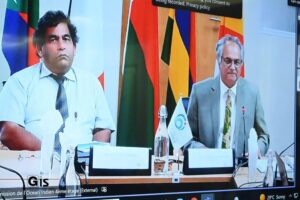Mauritius: The Minister of Land Transport and Light Rail, Minister of Foreign Affairs, Regional Integration and International Trade, Mr Alan Ganoo, participated yesterday, in the Extraordinary meeting of the Indian Ocean Commission (IOC) Council of Ministers, at the Newton Tower, in Port-Louis.
The Extraordinary meeting was held virtually and was chaired by the Minister of Foreign Affairs of Madagascar and the new Chairperson of the Council of Ministers of the IOC, Mr Richard Randriamandrato.
The meeting comprised members from the five IOC Member States and dwelt on the following issues: the 5th Summit of the Heads of States and Government; Maritime Security and the outline of a second phase of the Maritime Security (MASE) programme; the revised Reglèment Intérieur of the IOC which provides for the mandate of its organs and rules of procedure and; COI Horizon 2030.
In his opening remarks, Minister Ganoo recalled that forty years have lapsed since Madagascar, Mauritius, and Seychelles were brought together for the historic Port-Louis Conference.

“During these 40 years, the IOC has evolved to become one of the key vehicles for regional cooperation in the southwest Indian Ocean and is currently managing a portfolio of projects for an approximate amount of 180 million euros,” he stated.
Mr Ganoo indicated that the global economy continues to face significant challenges from the lingering effects of the COVID-19 pandemic and alarming inflationary pressures.
“All of these factors negatively impact the economic outlook for 2023, and that is why Mauritius is pushing for a greater role for the IOC in the economic sector,” he pointed out.
He further emphasized the need to strengthen our capacity to compete in an increasingly tough environment as we are compelled to turn to external markets, given the small size of our markets.
“It is incumbent upon us to forge strategic alliances, and the IOC has an important role to play so as to boost our economies and ensure sustainable development,” Mr Ganoo added.

On this note, the Minister lauded the IOC Presidency’s initiative for economic recovery, adding that Mauritius has always worked for a deepening of regional integration in the Indian Ocean by advocating the creation of an economic and trade area which is an essential prerequisite for attracting private investment, increasing production capacity and harmonizing rules.
Mauritius, Mr Ganoo highlighted, has expressed the wish that the shared economic and trade space on large value chains and trade agreements be included as a specific axis in the new IOC Strategic Development Plan (SDP) as this will enable us to move towards a stronger regional integration that will benefit all the people of our region.
Speaking of Maritime security, Minister Ganoo underlined that it is of paramount importance for international trade, tourism and economic development and for the protection of our resources, among others.
On this note, he dwelt on the operation Yellowfin under the MASE, which took place from 14 to 21 November 2022 in the co-management area of Seychelles and Mauritius and which allowed our countries to combine efforts for better efficiency in maritime security.
In addition, he recalled that Mauritius had contributed immensely in this field by jointly organizing with the IOC two ministerial conferences on maritime security in 2018 and 2019 and is planning to organize a third edition soon.
As regards climate change, the Minister highlighted that during this decade, major upheavals related to environmental change had been noticed.
“The problems caused by climate change, the degradation of our biological diversity heritage, the progressive increase of ozone-depleting substances and global warming are issues that affect our future and need to be solved together,” he pointed out.
Minister Ganoo also outlined some areas that mobilize the IOC members, including the depth of the ties that unite us and the values of peace, security and sustainable development that nourish the spirit of solidarity.

On this note, he indicated that the IOC has embarked on the elaboration of its next SDP, which will breathe new life into the IOC’s vision and objectives.
He indicated that the new SDP proposes to develop a human development agenda by investing in health, education, training, research, and culture while promoting the empowerment of youth and women. “
The proposal for the integration of youth in regional cooperation in the Indian Ocean and in all projects and activities implemented within the IOC is commendable as the youths represent the future workforce of the region,” he stated.
Furthermore, the Minister announced that the IOC has also embarked on a dynamic process of modernization and strengthening of the Secretariat supported by the Moroni Declaration in 2019 and the revision of the Victoria Agreement in 2020.
One of the key reforms of this strengthening, he underscored, is the accreditations to the nine pillars of the European Union and the Green Climate Fund, and to obtain these accreditations, the IOC will need to recruit more than twenty staff over the next three years.
“This exercise will require additional and substantial contributions from Member States and, despite our difficult economic situation, we will all have to assume the financing of these recruitments as it will yield results in the long term,” Mr Ganoo remarked.
The Indian Ocean Commission
The Indian Ocean Commission (IOC) is an intergovernmental organization composed of five Member States, namely: Comoros, Reunion Island, Madagascar, the Republic of Mauritius and; Seychelles.
It was created by the Port-Louis Declaration in 1982 and was institutionalized in Seychelles in 1984 by the General Agreement on Cooperation, better known as the “Victoria Agreement”.
Its objective is to defend the unique characteristics of its Member States in the continental and international arenas. With the active support of a dozen international partners, the IOC gives concrete substance to regional solidarity through cooperation projects covering more or less the 17 sustainable development goals.

